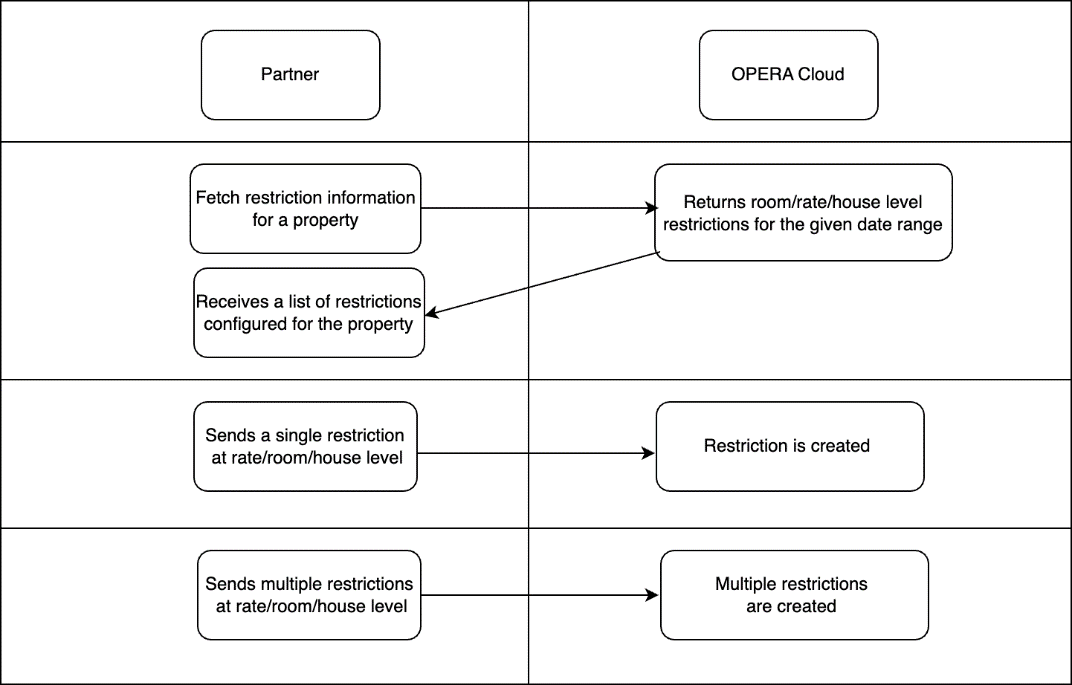Restrictions Management
Restrictions help you manage occupancy and revenue (RevPAR) by defining the conditions under which specific rates, room types, and/or room classes are available to sell for new reservations. For example, you could place a two-night minimum stay restriction on all rooms and rates during a weekend when demand is high, or you could set extended stay durations on certain room types and rates to ensure maximum revenue is achieved over periods of high demand. Restrictions can be set at the house level, meaning that any restrictions placed are applicable to all rooms/room types or based on the channel, rate code, rate category, room type, or room class.
Figure 4-7 Restrictions Management Workflow

Use Cases
| Use Case | Description | Operation |
|---|---|---|
| Posting a single restriction | You can post a single restriction. You can create a Restriction at various levels, such as house level, rate class, rate category, rate plan, room class, room type, and booking channel code. You can combine restrictions to apply to more than one element. For example, you are able to restrict reservations for a specific room type and rate code combination. | postRestriction |
| Posting multiple restrictions | You can create up to 1000 restrictions at once with postRestrictions. These can be created at various levels such as house level, rate class, rate category, rate plan, room class, room type, and booking channel code. You can combine restrictions to apply to more than one element. For example, you are able to restrict reservations for a specific room type and rate code combination. | postRestrictionsProcess |
| Retrieving restrictions for a hotel for a given date range | You can retrieve the Restrictions for a hotel in a given date range. The search criteria can include filter codes or restriction control types, date range, and the hotel information. | getRestrictionsByDateRange |
1. Posting a single restriction using postRestriction
The synchronous operation postRestriction is used to set or update one restriction at a time for a hotel. Restrictions can be set at the house level, meaning that any restrictions placed are applicable to all rooms/room types or based on the channel, rate code, rate category, room type, or room class.
| Business Logic | Comments |
|---|---|
| Posting a single restriction |
The restrictions can be set using specific parameters to control room availability and booking patterns. hotelId: Specifies the hotel for which restrictions are being set. You can send the specific restriction details to be posted with the following information:
|
| Key Considerations |
|
| Validation | Validate the applied restrictions through the RMS to ensure they match the intended configurations and do not conflict with other restrictions or booking policies. |
| Sample API request/response |
postRestriction
|
2. Posting multiple restrictions using postRestrictionsProcess
The asynchronous operation postRestrictionsProcess is used to set or update multiple restrictions for a hotel for a given date range. The postRestrictionProcess endpoint is designed for setting or updating restrictions on reservations in a hotel system. These restrictions can include rules such as minimum length of stay, specific rate plans, room types, and other conditions that control how rooms can be booked.
| Business Logic | Comments |
|---|---|
| Posting multiple restrictions |
The restrictions can be set using the following parameters to control room availability and booking patterns.
You can send the specific restriction details to be posted with the following information:
|
| Key Considerations |
|
| Validation | Validate the applied restrictions through the RMS to ensure they match the intended configurations and do not conflict with other restrictions or booking policies. |
| Sample API request/response |
1.
postRestrictionsProcess
2. getRestrictionsProcessStatus
3. getRestrictions
|
3. Retrieving restrictions for a hotel for a given date range
The synchronous operation getRestrictionsByDateRange is used to retrieve detailed information about the restrictions applied to a hotel's booking process within a specified date range. This information is crucial for understanding and managing booking limitations, ensuring compliance with hotel policies, and optimizing room inventory. You can utilize the data for operational planning, revenue management, and enhancing the guest booking experience.
| Business Logic | Comments |
|---|---|
| Retrieving restrictions |
The restrictions data can be requested using restrictionSearchCriteriaStartDate and end to fetch the restrictions for a specified date range.
Other critical parameters include:
|
| Key Considerations |
|
| Key Response Data Elements |
The key response data elements include: RestrictionsByDateRange:
RestrictionSets:
|
| Sample API request/response |
getRestrictionsByDateRange
|
Parent topic: RMS Use Cases